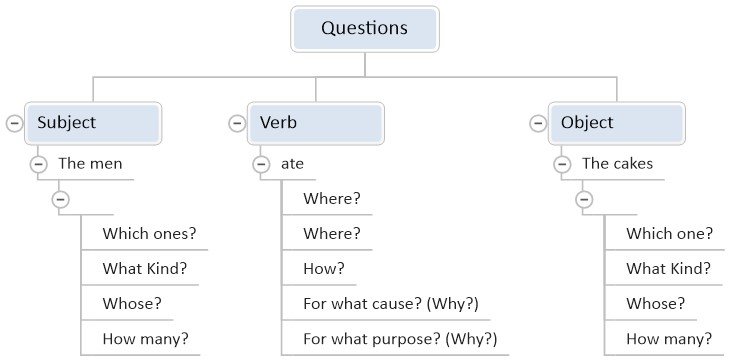How to Ask the Right Questions - Good Communication Skills
How to Ask the Right Questions
Good communication is not just about the proper presentation of ideas. Good communication also means developing the ability to ask the right questions.
How can you know what are the right questions? Simple. Learn the following method.
Essentially there are two sets of questions that you should think about.
- Set one: A set of questions that relate to people, things and ideas. (ie the subjects and objects of sentences).
- Set two: A set of questions that relate to verbs, (verbs are words denoting actions, or states).
Set one questions are Adjective questions. Set two questions are Adverb questions.
Have a look at the simple sentence in this diagram. The men ate the cakes

The set one questions are:
- Which ones?
- What kind?
- Whose?
- How many?
These questions apply to subjects and objects of sentences.
On the other hand, set two questions relate to the verbs of sentences. The set two questions (Adverb questions are):
- Where?
- How?
- When?
- Why?
- For what purpose?
- For what causes?
Learn these two lists of questions. Whenever you listen or read something, find the "doer" of the sentence and apply the set one questions.
Then find the verb, or action, of the sentence and apply the set two questions.
Look at this easy example: The bird is singing in the tree.
- Which bird?
- What kind of bird?
- How many birds?
- Whose bird?
The bird is singing in the tree.
- Where is it singing?
- How is it singing?
- When is it singing
- Why is it singing?
- For what purpose is it singing?
- What caused it to sing?
The bird is singing in the tree.
- Which tree?
- What kind of tree?
- How many trees?
- Whose tree?
This simple system of asking questions is easy. Learn it, apply it and you will get great results.
16 Ways You Can Use Questions (blog)
Definition: Two-set Question Method
In business communication, the Two-set Question Method is a simple method. It splits every question into two clear groups, one for nouns and one for verbs. Each group holds a fixed list of core questions. Users apply the lists to test each sentence, uncover gaps and sharpen meaning.
Show CG4D Definition
- Splits questions into two predefined sets: adjective questions and adverb questions
- Aligns each set with sentence parts: nouns for set one, verbs for set two
- Uses fixed core lists (four adjective queries, six adverb queries) that must stay intact
- Serves to test and improve the clarity, accuracy and completeness of spoken or written statements
Article Summary
Good talk grows from good questions. When you ask the right questions-who, what, which, where, why and how-you break each sentence into parts, spot gaps and guide the talk. This two-list method lifts listening, sharpens writing and boosts trust in every chat.
Frequently Asked Questions
Here are some questions that frequently get asked about this topic during our training sessions.
What is the Two-set Question Method in clear words?
How do adjective questions help me ask the right questions?
When should I use adverb questions during a talk?
Can this questioning technique improve my writing as well as speaking?
What common mistake should I avoid when learning this method?
How can I practise the two sets quickly each day?
Is the method suitable for children learning grammar?
Thought of something that's not been answered?
Did You Know: Key Statistics
The 2023 LinkedIn Workplace Learning Report says 91% of workers feel that managers who ask clear follow-up questions build stronger trust. A 2024 McKinsey Global Survey finds teams that use a set method for asking questions solve problems 28% faster than those that do not.Blogs by Email
Do you want to receive an email whenever we post a new blog? The blogs contain article 5-10 minutes long - ideal for reading during your coffee break!
Further Reading in Communication - Clear Communication
-
Effective Communication in the Workplace - Practical Examples for Success
Learn practical, effective communication skills to set clear goals, give feedback, manage conflict and boost workplace morale. Discover steps for success.
Read Article > -
Six Top Tips to Improve Your Communication
Learn how to improve communication with six clear tips: speak with clarity, reason and optimism, listen actively, ask smart questions and respect people.
Read Article > -
Communication: Negotiation Skills
Learn practical negotiation skills that create win-win agreements, boost confidence and secure better business outcomes. Join our in-house training course today
Read Article > -
Six Step Formula for Investigative Interviews
Use a six-step investigative interview method: listen, take notes, probe answers, flag contradictions, set the timeline and capture a narrative as evidence.
Read Article > -
Training to Improve Your Communication Skills
Learn nine simple steps to improve communication skills: clear speech, active listening, confident voice, smart body language and polite style. Build trust now.
Read Article >
Looking for Communication Skills Training?
If you're looking to develop your Clear Communication Skills, you may find this Communication Skills Training Course beneficial:
Open Training Course Pricing and Availability
Next Open Course Starts in 10 days, Leeds City, places available







